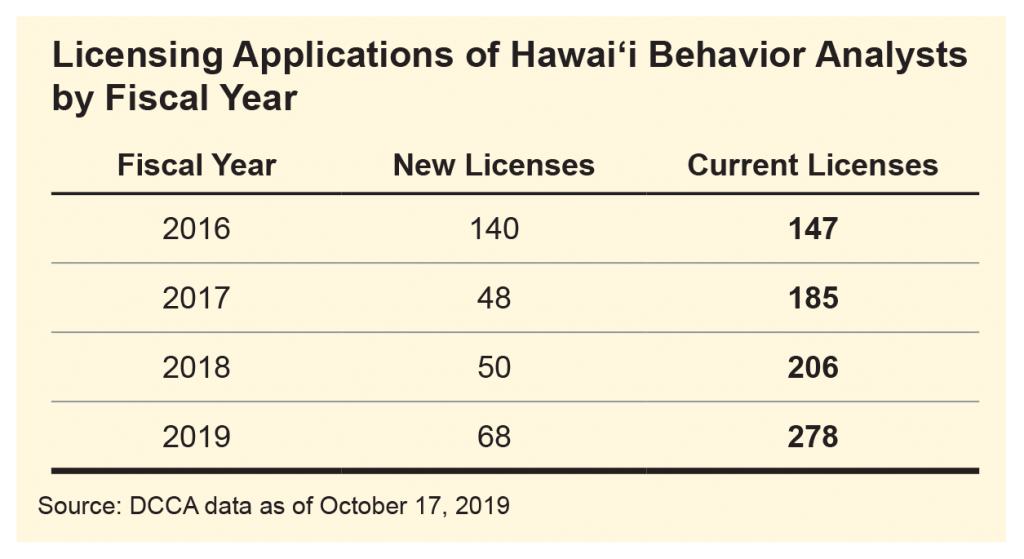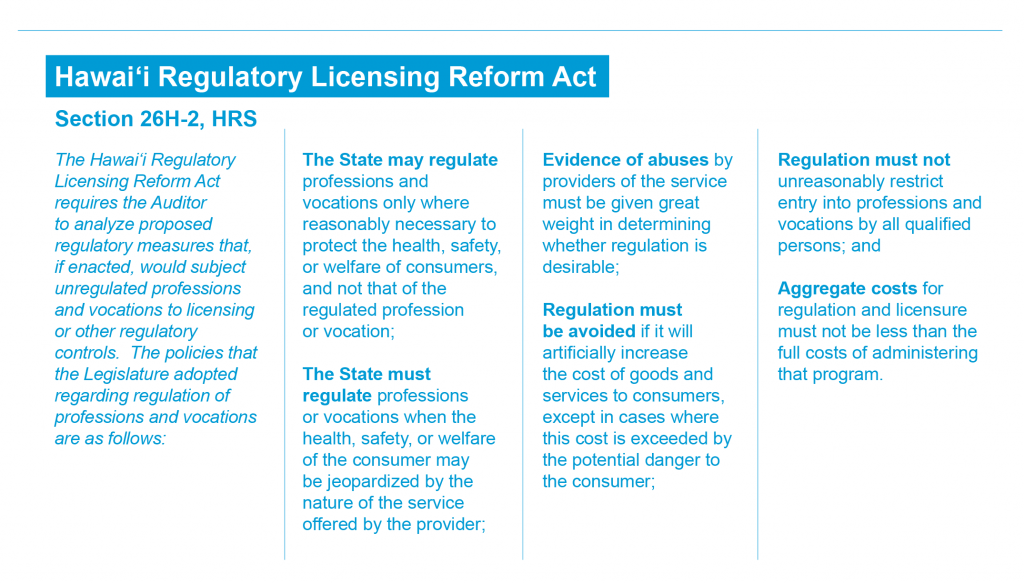20-20, Sunset Evaluation: Regulation of Behavior Analysts
Posted on Dec 30, 2020 in SummaryAuditor’s Summary
The current licensing requirement for behavior analysts should be extended beyond its sunset date.
THE PRACTICE OF APPLIED BEHAVIOR ANALYSIS seeks to understand and change the behavior of individuals. Behavior analysts evaluate a person’s behavior, identify target problem behaviors, and establish intervention tools based on evidence-based principles of behavior analysis that are designed to decrease the problem behaviors and increase desired behaviors. Applied behavior analysis is used in a variety of settings, including homes, clinics, schools, and universities, and practitioners often provide services to vulnerable children and adults.
In Report No. 20-20, Sunset Evaluation: Regulation of Behavior Analysts, we found that regulation of behavior analysts is consistent with and supported by the criteria for professional licensing set forth in the Hawai‘i Regulatory Licensing Reform Act, Chapter 26H, Hawai‘i Revised Statutes (HRS). In our view, the current licensing requirement for behavior analysts is reasonably necessary to protect the health, safety, and welfare of children and adults receiving services from a behavior analyst. However, while we found that criteria for continued regulation were met, if the Legislature continues the current regulation of behavior analysts, we recommend that behavior analysts be required to provide the Department of Commerce and Consumer Affairs (DCCA) with proof of their active status as a Board Certified Behavior Analyst or Board Certified Behavior Analyst-Doctoral as part of the license renewal process.
Registration requirements
To obtain a license in Hawai‘i, an applicant must have passed the Board Certified Behavior Analyst examination and maintain an active status with the Behavior Analyst Certification Board as a certified behavior analyst. Applicants must attach a copy of their certification status to the license application, as well as have the board directly provide DCCA with a letter confirming the applicant’s current certification status. In addition, applicants must provide information about pending criminal convictions and disciplinary actions. Upon receipt of a complete application and payment of a registration fee, applicants are licensed by DCCA as behavior analysts and are entitled to engage in the practice of applied behavior analysis statewide.
The regulation will “sunset” on June 30, 2021, after which there will be no state oversight of the profession unless the Legislature enacts legislation to continue regulating behavior analysts in Hawai‘i.
Criteria met
The behavior analyst utilizes principles and procedures to improve skills in a range of common activities including communication, learning, eating, playing, and sleeping. In unique cases, if individuals exhibit severe challenging behaviors, including causing harm to themselves or others, behavior analysts can perform physically invasive or potentially hazardous procedures that require specialized training. These specialized procedures are used primarily to de-escalate dangerous situations. In contrast, treatment by unqualified providers of applied behavior analysis could lead to ineffective or delayed treatments of those with behavioral problems, which could even exacerbate problems and result in life-long deleterious effects. For children who use the services of a behavior analyst, inappropriate or incorrectly provided early intervention services can damage a child and foster increased problems as a child matures.
In our review, we also found that Hawai‘i’s regulation of behavior analysts does not appear to artificially increase consumer costs. On the contrary, since 2015, the State has mandated insurance coverage for applied behavior analysis services for autism treatment. Such increased access to these services likely lowers consumer costs.
We also found that regulation does not unreasonably restrict entry into the profession by qualified persons. The standards are available to anyone meeting the education and practicum requirements and are similar to those established by other states that license or otherwise regulate behavior analysts. Moreover, we found no evidence the cost to obtain a license in Hawai‘i is deterring applicants. Based on DCCA’s estimated costs of the behavior analyst licensing program, the aggregate of the fees collected from licensees appears to cover the full cost of administering the program.
Since Hawai‘i’s licensing requirement took effect in 2016, the number of licensed behavioral analysts has nearly doubled.
What a behavior analyst does
A behavior analyst works with individuals to identify treatments based on reaction and behavior. Behavior analysts are typically at the top of a treatment hierarchy acting as case supervisors responsible for assessing, designing, and implementing behavior change programs, while also training and supporting other related service providers such as Board Certified Assistant Behavior Analysts, Registered Behavior Technicians, parents, educators, or others who comprise multidisciplinary teams serving an individual receiving behavior analysis services.


